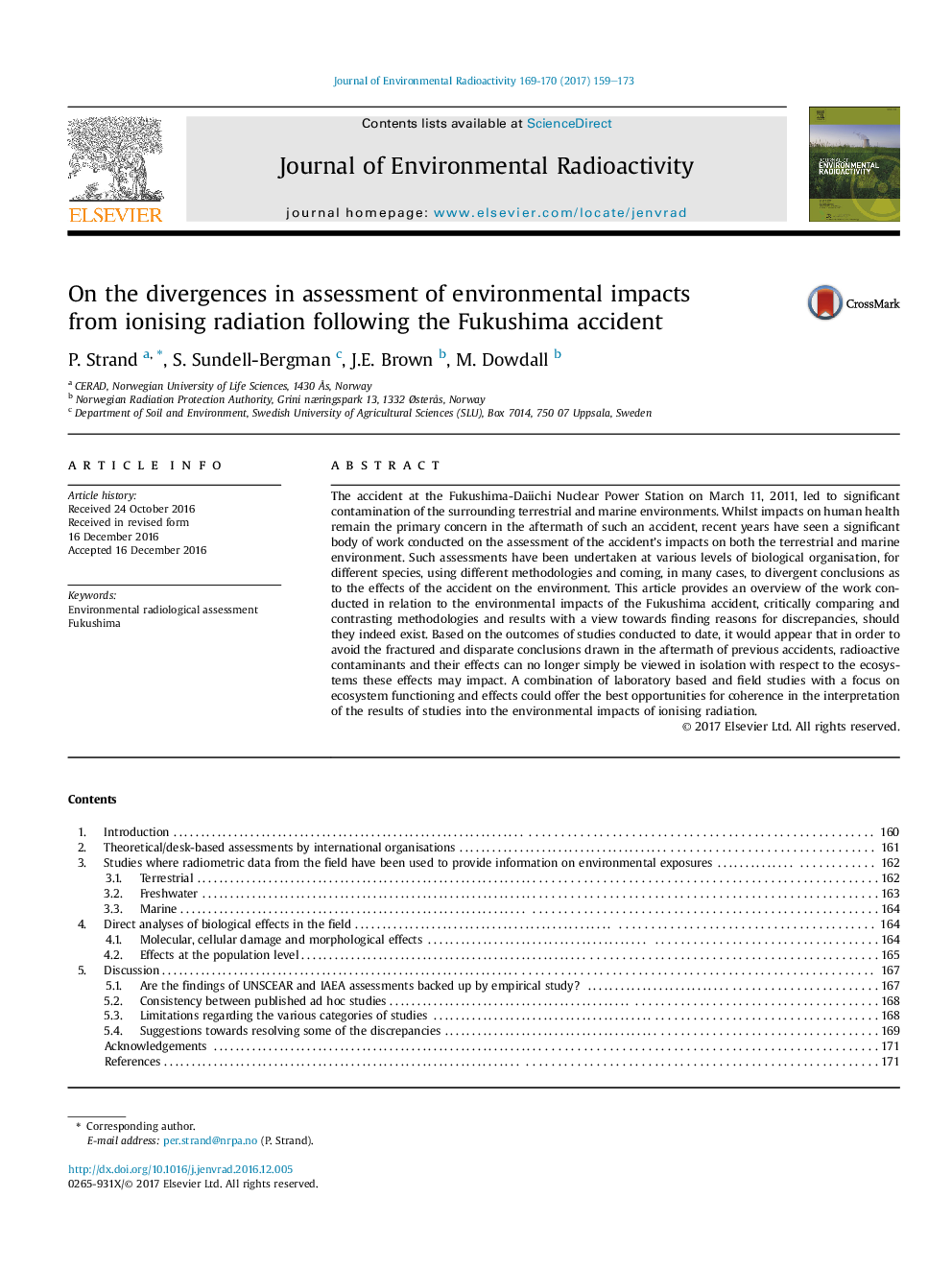| کد مقاله | کد نشریه | سال انتشار | مقاله انگلیسی | نسخه تمام متن |
|---|---|---|---|---|
| 5477726 | 1521569 | 2017 | 15 صفحه PDF | دانلود رایگان |
عنوان انگلیسی مقاله ISI
On the divergences in assessment of environmental impacts from ionising radiation following the Fukushima accident
ترجمه فارسی عنوان
در تناقض در ارزیابی اثرات زیست محیطی از تابش یونیزه پس از حادثه فوکوشیما
دانلود مقاله + سفارش ترجمه
دانلود مقاله ISI انگلیسی
رایگان برای ایرانیان
کلمات کلیدی
ارزیابی زیست محیطی محیط زیست، فوکوشیما،
ترجمه چکیده
حادثه در نیروگاه هسته ای فوکوشیما-دایشی در 11 مارس 2011، منجر به آلودگی قابل توجهی از محیط اطراف زمین و دریایی شد. در حالی که تأثیرات بر سلامت انسان همچنان نگرانی اصلی پس از چنین حادثه ای است، در سال های اخیر، کارهای قابل توجهی در زمینه ارزیابی اثرات حادثه در محیط زمین و دریا دیده شده است. چنین ارزیابی ها در سطوح مختلف سازمان بیولوژیکی برای گونه های مختلف، با استفاده از متدولوژی های مختلف انجام شده است و در بسیاری از موارد به نتایج متفاوتی برای اثرات تصادف بر محیط زیست می رسند. این مقاله خلاصه ای از کار انجام شده در ارتباط با اثرات زیست محیطی حادثه فوکوشیما را ارائه می دهد، روش های نقدینگی و متضاد و نتایج را با نگاهی به پیدا کردن دلایل اختلاف، اگر در واقع وجود داشته باشد، ارائه می دهد. بر اساس نتایج مطالعات انجام شده تاکنون، به نظر می رسد که به منظور جلوگیری از نتایج شکست خورده و متمایز پس از حوادث قبلی، آلاینده های رادیواکتیو و اثرات آنها نمی توانند به سادگی با جدیت با توجه به اکوسیستم ها مشاهده شوند اثرات ممکن است تاثیر بگذارد. ترکیبی از مطالعات مبتنی بر آزمایشگاه و مطالعات میدانی با تمرکز بر عملکرد و اثرات اکوسیستم می تواند بهترین فرصت را برای یکپارچگی در تفسیر نتایج مطالعات درمورد اثرات زیست محیطی تابش یونیزه ارائه دهد.
موضوعات مرتبط
مهندسی و علوم پایه
مهندسی انرژی
انرژی هسته ای و مهندسی
چکیده انگلیسی
The accident at the Fukushima-Daiichi Nuclear Power Station on March 11, 2011, led to significant contamination of the surrounding terrestrial and marine environments. Whilst impacts on human health remain the primary concern in the aftermath of such an accident, recent years have seen a significant body of work conducted on the assessment of the accident's impacts on both the terrestrial and marine environment. Such assessments have been undertaken at various levels of biological organisation, for different species, using different methodologies and coming, in many cases, to divergent conclusions as to the effects of the accident on the environment. This article provides an overview of the work conducted in relation to the environmental impacts of the Fukushima accident, critically comparing and contrasting methodologies and results with a view towards finding reasons for discrepancies, should they indeed exist. Based on the outcomes of studies conducted to date, it would appear that in order to avoid the fractured and disparate conclusions drawn in the aftermath of previous accidents, radioactive contaminants and their effects can no longer simply be viewed in isolation with respect to the ecosystems these effects may impact. A combination of laboratory based and field studies with a focus on ecosystem functioning and effects could offer the best opportunities for coherence in the interpretation of the results of studies into the environmental impacts of ionising radiation.
ناشر
Database: Elsevier - ScienceDirect (ساینس دایرکت)
Journal: Journal of Environmental Radioactivity - Volumes 169â170, April 2017, Pages 159-173
Journal: Journal of Environmental Radioactivity - Volumes 169â170, April 2017, Pages 159-173
نویسندگان
P. Strand, S. Sundell-Bergman, J.E. Brown, M. Dowdall,
